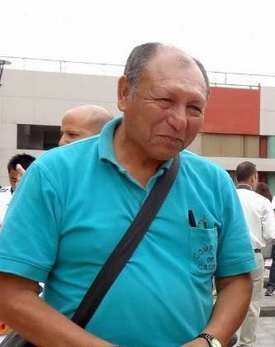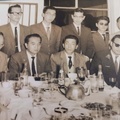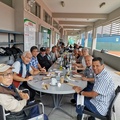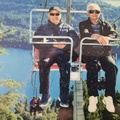The Estadio la Unión (AELU), in its 68 years of institutional life, housed countless stories within its perimeter. Stories of sporting triumphs, of goals in exciting arrivals, of romances that ended on a religious altar, of matches that in the end destroyed friendships, of encounters that united lives, of unfinished careers and victorious matches, of friendships that were born and goodbyes that ended in crying
Of thousands and thousands of postcards that adorn our family homes, of legendary athletes who today represent us on the front of many stages, of memories and encounters that only brought forth countless joys and tears, and of friends who only sought attitude with their work. . Where some simply had their hours of recreation, others looked for the news on red days. Their mission was results, revered triumph or figurative defeat. We saw them silent, with their cameras, their backpacks on their shoulders and that step that stands out when one has responsibilities. Calm, humble and with the greeting ready to look for the news, to rehearse the taking of a ceremony, to be present where that will remain in history, or at the last second, at the finish line of a close finish of the classic hundred meters of our Undokay. They will feel that tomorrow the news will be the pleasant way to find hot coffee, the friendly chat of an editor or the continuous rotation of a news item that, because it is exciting, tragic, comic or divine, will be the cover of a next edition. .
Mario Teves. He left us in the silence of a confinement that, even tied up by this pandemic, we cannot understand. Friends leave us, with confinement or without confinement, with or without care, it is an invisible and treacherous enemy, an enemy that is only waiting to deliver the final blow. Although it is true that we had not seen each other for more than a year, I knew that I would soon return to the sports pages of the newspaper Perú Shimpo , and that we would soon see each other at the AELU facilities. He, with his camera, in the company of Lucho Valderrama, from the newspaper Prensa Nikkei , and I with my carefree walk as a retired walker. And we also knew that the third of Los Mosqueteros, Mr. José Flores, from the AELU newsletter , had left us on May 12, 2020, in the midst of the crisis due to the coronavirus pandemic. Two friends, one destiny.
They were called “The Three Musketeers”, three journalists from three different publishers in the Japanese colony. Today only Mr. Luis Valderrama is present. My namesake, as I call him. And we both know that in this silence “there are such strong blows in life,” that we did not expect a hasty absence of two friends. Eternal rest for José Flores and Mario Teves.
I knew Mr. Mario Teves since I visited the newspaper Perú Shimpo , in the Puno district of Barrios Altos in Lima, and where I once dared to have Mr. Juan Cabrera introduce me to Mr. Chihito Saito, so that I could work in the newspaper. It was in 1961 and I was unlucky not to find a job. The only thing that linked me to the newspaper was that I collaborated on its Sunday page which, years later, led me to make friends with Ricardo Mitsuya Higa, who some time later introduced me to Mr. Mario Teves.
At the end of the last century, I collaborated with my column “Cerca al corazón” and while I was practicing and playing tennis, Mario looked for me to give him certain information about the championships that were held at the AELU. I became so passionate about white sports that I left fishing, which for many years had replaced soccer and cycling. One afternoon I invited Mario to have a cup of coffee at the tennis restaurant and Mario invited me to write about tennis and its participants in the newspaper. “I give you space for your weekly column,” he told me, “and you can write anything that comes to mind.” This is how a close friendship with Mario Teves was born.
We created the column and “Set Point with Aelucoop” was born, an exclusive corner of AELU Tennis. This column came out on Thursdays and Mario was the person who came to pick up the work that I had already prepared. We did reports, biographies, humorous facts, articles from the championships, social notes and works based on caricatures of our good friend and tennis player Juan Kobashikawa. And from the many ideas that Mario had, the photo “Cicuta” was born, a creation exclusively by Mario. He provided me with the photographs and I added the captions. In many of the photos you could see characters from the Japanese community at that time. I learned a lot from Mario Teves during the time we had a relationship with the Set Point column and friendship, the one that marks the milestones in life, had no better idea than to expand my world in the pages of the newspaper Perú Shimpo .
Today resignation brings with it thinking and pondering. Life, the one that we lead along the path that our parents laid out for us, is made up of nuances in the world in which we live. And if it is about enjoying, it is in youth where energy fills us with courage and triumph crowns us as the best. La Unión Stadium represents the maximum development of our sporting activities, what is the flow of physical development and values in a competitive, responsible and healthy world. And in it moves a whole world of people who make life more bearable for us within the AELU. Administrative staff, sports professionals, health, cleaning and communications. And within that, sports journalists. It is a shame that in this first year of the pandemic the AELU and the newspaper Perú Shimpo are covered in sadness and mourning.
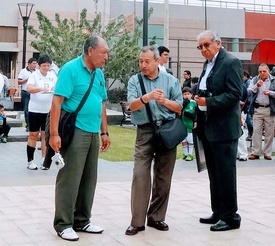
José Flores and Mario Teves left us writing desks and chairs in complete solitude. “The Three Musketeers” broke a dynasty of more than forty years in the news business. Only Luis Valderrama, with a piece of paper in hand, will obtain the data on results in straight sets, in goals for or against, in stopwatch times on the courts, in tight finishes at the foot of the pools, in baseball races or bases full. , or simply the game not played or suspended. And we will once again have young journalists on the lookout. Paper in hand and pen at the ready, perhaps no longer photographic machines, just cell phones. The printed photos will have a different tone and the sensation in the news will be different. Time will pass and the loose pages will obtain the ocher color ten times over, someone will tell me. The replacement of José, Mario and Ricardo, who have a different style. And I will simply say “each journalist has their own style, there are those who write with reason. And others with the heart.”
© 2021 Luis Iguchi Iguchi


